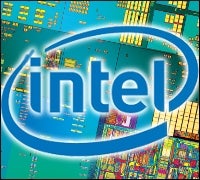 |
Intel on Monday announced a rare alliance with a near-competitor, the Taiwan Semiconductor Manufacturing Company (TSMC), to collaborate on the joint development of Atom-based system-on-a-chip (SoC) designs.
Additionally, Intel (NASDAQ: INTC) also announced four new Atom designs, which it said will be targeted at specific markets. These chips would be done entirely by Intel and separate from the TSMC partnership.
The collaboration will give Intel access to TSMC’s intellectual property, making it easier for customers to build SoC designs around Atom, Intel’s family of chips for mobile and embedded devices.
By porting its Atom processor CPU cores to TSMC’s technology, Intel aims to expand Atom SoC offerings to a wider range of applications developed by third parties.
NEW
Many Intel customers had an existing IP infrastructure with TSMC that they would like to take advantage of in some way, said Anand Chandrasekher, senior vice president and general manager of Intel’s Ultra Mobility division, during a conference call Monday morning.
NEW
“It’s about enabling Atom on TSMC,” he said on the call. “It will allow TSMC to go after new market segments as well as allowing Intel and TSMC to go after new market segments together.”
NEW
He added “It’s all about collaboration, not about capacity.” Word of the announcement caused rampant speculation among the trade press that Intel would actually farm out Atom manufacturing to TSMC, but Intel made very sure to shoot down that notion.
NEW
“We’re not passing over manufacturing,” said Sean Maloney, executive vice president of sales and marketing at Intel. “TSMC and Intel are both happy where they are.” The two companies would pursue markets of mutual interest, such as embedded, CE, netbooks, settop devices and handhelds.
“This effort will make it easier for customers with significant design expertise to take advantage of benefits of the Intel Architecture in a manner that allows them to customize the implementation precisely to their needs,” Paul Otellini, Intel’s president and CEO, said in a statement.
The move is out of character for Intel, which has the size and strength to go it alone on almost any project. Still, Dean McCarron, president of Mercury Research, said the new approach has a lot to offer.
“Ultimately, it makes sense for them to do this and not go on their own,” McCarron told InternetNews.com. “They would have to design their own core for everything imaginable. It’s a big resource burden. Ultimately, we’re dealing with a market that is so broad that not even a company with Intel’s resources could cover it all.
“Why build a new wheel when you got someone else with a catalog of wheels you can use?” he added.
Head-to-head with ARM
Intel has done a deal like this only once before. In the early 90s, it partnered with semiconductor manufacturer VLSI to produce an x86-based processor called Polar, which would go into PDAs. But with the PDA market still years from fruition, many of those products never came out — including ones based on Polar.
The deal with TSMC also puts Intel on a collision course with ARM, the semiconductor technology used in a wide array of embedded devices, most notably the Apple (NASDAQ: AAPL) iPhone. ARM’s processor technology, unlike Intel’s technology, is open to modification and additional technologies. Licensees can take the basic ARM core and add or modify it, as Apple has done and nVidia did with the Tegra processor.
[cob:Special_Report]But Intel-TSMC deal is different in that Intel will not allow similar kinds of modification for its processors, and it has approval over SoC designs.
McCarron said it’s a sign Intel is focusing on more than just selling CPUs for PCs.
“They are working on expanding their market, and to expand, you need to be in these other segments,” he said. “So they had to deal with someone who had these in their product portfolio. I think this is a setup for a long-term move into things like smartphones and other highly integrated devices.”
Update adds comments from the TSMC call as well as the new Atom announcements.


